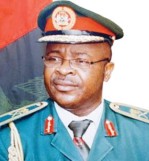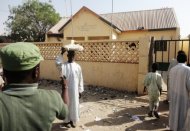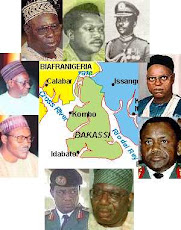By Christopher Isiguzo
About 14 fresh bodies were recovered yesterday in Ezillo community in Ishielu Local Government Area of Ebonyi State, raising the death toll from last Saturday’s invasion of the community by gunmen to 66.

Also, Governor Martin Elechi, has said the unfortunate development marked a bad omen for the state, given the number of lives lost in the attack.
Initially, the number of deaths was 52; it later rose to 60 before it rose to 66, according to the youths of the area who had been combing bushes in the area in search of bodies of slain relatives and friends.
The youths who spoke to journalists, who accompanied the Assistant Inspector General of Police (AIG) in charge of Zone 6 Calabar, Mr. Saidu Daya, to assess the level of carnage in the area, stated that the dead bodies were recovered when a search team constituted by the villagers combed nearby bushes and environs.
The victims comprising children between the ages of three to 10 years, men, adults and the elderly had different parts of their bodies severed while others had mortal gunshot wounds.
The police AIG confirmed that a team of mobile policemen from neighbouring Cross River, Rivers and Akwa Ibom states have already arrived the State and deployed to the crisis area to beef-up security and restore normalcy.
He said detectives from force headquarters Abuja will equally be drafted to Ebonyi State to carry out investigation with a view to fishing out those behind the attack.
Daya appealed to the Inspector-General of Police, Mr. Hafis Ringim, to authorise the establishment of mobile police unit at Ezillo.
The AIG who was accompanied by the state Commissioner of Police, Mr. Adeola Adeniji, also used the opportunity to console the people of the area including the traditional ruler, Eze Chima Oyiba, who lost one of his sons, four vehicles and property worth millions of naira, after he narrowly escaped.
At the end of the visit, the AIG paid a condolence visit to Elechi at Government House Abakaliki, where he commiserated with him and assured that the police would do all that was necessary to bring solution and also bring the perpetrators of the dastardly act to book. He said he was sent on the visit by the IGP, Ringim, who he said expressed his sympathies over the tragic incident.
In a state-wide broadcast yesterday tagged: “That Evil May Not Endure”, Elechi expressed dismay over the resurgence of the communal crisis which was thought to have been resolved, said the latest development was a phase in the cycle of destruction and bloodletting which have been the lot of the people of the area since May 10, 2008 when the crisis initially broke out.
“The shock waves sent by the latest incident are not only because of the wantonness of the destruction, but also because it came at a time when Ebonyi people and other Nigerians thought that peace had returned to Ezillo.
“As Ezillo burns and Ebonyi people mourn, I want to assure our people and all Nigerians that the State government will stop at nothing to fish out the perpetrators of this dastardly act neither shall we shirk our responsibility to protect lives and property everywhere in the state. We all feel the pains of the bereaved families and we all share their grief,” the governor noted.
The governor further noted in his broadcast that “enemies of peace invaded Ezillo in the early hours of yesterday (December 31, 2011) and proceeded to murder men, women and children who had no inkling about the tragedy that befell them. That was not all. The Ezillo market was burnt down, shops were razed, vehicles burnt and other properties destroyed.”
He however assured people of the state that the security agencies have been given directives to clear the Abakaliki-Enugu Federal Highway which cuts across the warring community of any kind of blockade in order to ensure free-flow of traffic.
Already, the governor has asked the State Emergency Management Agency (SEMA) to undertake an urgent assessment of the conditions at the crisis area for immediate state intervention.
However, sources at the community told THISDAY that more corpses were recovered late Saturday from the bush within the village, while the number of those who sustained bullet injuries is also on the increase.
Unknown gunmen had last Saturday invaded the Ezillo community killing scores of indigenes of the community including the Divisional Crime Officer (DCO) in charge of the police station in the area. Those killed include; children between the ages of three to five, aged men and women and youths, as well as over 100 Donkey.
Ezillo people had been fighting a communal war with Ezza-Ezillo people, which claimed more than 150 lives before the intervention of law enforcement agents in 2010 that sacked everybody from the disputed land. Since then, relative peace had pervaded the community.
Meanwhile, the South-east zone of the Civil Liberties Organisation (CLO) has condemned the mass killing of the innocent indigenes of Ezillo by unknown gunmen describing the development as act of terrorism.
In a statement by the Zonal Director, Olu Omotayo, the organisation called on the federal government to immediately find ways of ending such acts of barbarism and terrorism, noting that if left unchecked, there are still strong indications that the situation could go out of hand.










